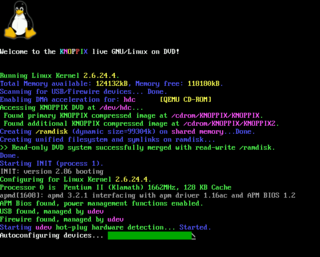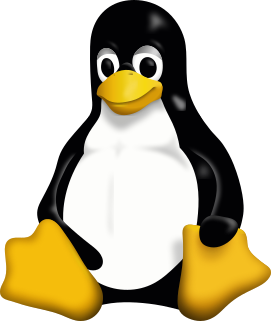
The Linux framebuffer (fbdev) is a graphic hardware-independent abstraction layer to show graphics on a computer monitor, typically on the system console. It allows direct access to the framebuffer using only the Linux kernel's own basic facilities and its device file system interface. It does not rely on user space software like SVGALib.
freedesktop.org (fd.o) is a project to work on interoperability and shared base technology for free software desktop environments for the X Window System (X11) and Wayland on Linux and other Unix-like operating systems. It was founded by Havoc Pennington from Red Hat in March 2000. The project's servers are hosted by Portland State University, which in turn are sponsored by HP, Intel and Google.
Arch Linux is a Linux distribution for computers based on x86-64 architectures. The Arch Linux repositories contain both libre, and nonfree software, and the default Arch Linux kernel contains nonfree proprietary blobs, hence the distribution is not endorsed by the GNU project.
Keith Packard is a software developer, best known for his work on the X Window System.

UPX is an open source executable packer supporting a number of file formats from different operating systems.
Mobilinux is a Linux kernel operating system targeted to smartphones. It was announced by MontaVista Software on April 25, 2005.
In software development, distributed version control is a form of version control in which the complete codebase, including its full history, is mirrored on every developer's computer. This enables automatic management branching and merging, speeds up most operations, improves the ability to work offline, and does not rely on a single location for backups.
OpenEmbedded is a build automation framework and cross-compile environment used to create Linux distributions for embedded devices. The OpenEmbedded framework is developed by the OpenEmbedded community, which was formally established in 2003. OpenEmbedded is the recommended build system of the Yocto Project, which is a Linux Foundation workgroup that assists commercial companies in the development of Linux-based systems for embedded products.

A free and open-source graphics device driver is a software stack which controls computer-graphics hardware and supports graphics-rendering application programming interfaces (APIs) and is released under a free and open-source software license. Graphics device drivers are written for specific hardware to work within a specific operating system kernel and to support a range of APIs used by applications to access the graphics hardware. They may also control output to the display if the display driver is part of the graphics hardware. Most free and open-source graphics device drivers are developed by the Mesa project. The driver is made up of a compiler, a rendering API, and software which manages access to the graphics hardware.

Mercurial is a distributed revision-control tool for software developers. It is supported on Microsoft Windows and Unix-like systems, such as FreeBSD, macOS and Linux.
A kernel is the most fundamental component of a computer operating system. A comparison of system kernels can provide insight into the design and architectural choices made by the developers of particular operating systems.
Squashfs is a compressed read-only file system for Linux. Squashfs compresses files, inodes and directories, and supports block sizes from 4 KiB up to 1 MiB for greater compression. Several compression algorithms are supported. Squashfs is also the name of free software, licensed under the GPL, for accessing Squashfs filesystems.

The Jornada was a line of personal digital assistants or PDAs manufactured by Hewlett-Packard. The Jornada was a broad product line that included Palm-Size PCs, Handheld PCs, and Pocket PCs. The first model was the 820, released in 1998, and the last was the 928 model in 2002 when Compaq and HP merged. The Jornada line was then succeeded by the more popular iPAQ model PDAs. All Jornada models ran Microsoft Operating Systems that were based on Windows CE.

Wireless network cards for computers require control software to make them function. This is a list of the status of some open-source drivers for 802.11 wireless network cards.
Jornada Linux Mobility Edition or JLime is a Linux distribution originally aimed for the HP Jornada platform. It was created in late 2003 by Kristoffer Ericson and Henk Brunstin. It is developed using the OpenEmbedded build system.

Kernel-based Virtual Machine (KVM) is a virtualization module in the Linux kernel that allows the kernel to function as a hypervisor. It was merged into the Linux kernel mainline in kernel version 2.6.20, which was released on February 5, 2007. KVM requires a processor with hardware virtualization extensions, such as Intel VT or AMD-V. KVM has also been ported to other operating systems such as FreeBSD and illumos in the form of loadable kernel modules.
kernel.org is the main distribution point of source code for the Linux kernel, which is the base of the Linux operating system.

The Linux kernel is a free and open-source, monolithic, Unix-like operating system kernel. The Linux family of operating systems is based on this kernel and deployed on both traditional computer systems such as personal computers and servers, usually in the form of Linux distributions, and on various embedded devices such as routers, wireless access points, PBXes, set-top boxes, FTA receivers, smart TVs, PVRs, and NAS appliances. While the adoption of the Linux kernel in desktop computer operating system is low, Linux-based operating systems dominate nearly every other segment of computing, from mobile devices to mainframes. Since November 2017, all of the world's 500 most powerful supercomputers run Linux. The Android operating system for tablet computers, smartphones, and smartwatches also uses the Linux kernel.

SCHED_DEADLINE is a CPU scheduler available in the Linux kernel since version 3.14, based on the Earliest Deadline First (EDF) and Constant Bandwidth Server (CBS) algorithms, supporting resource reservations: each task scheduled under such policy is associated with a budget Q, and a period P, corresponding to a declaration to the kernel that Q time units are required by that task every P time units, on any processor. This makes SCHED_DEADLINE particularly suitable for real-time applications, like multimedia or industrial control, where P corresponds to the minimum time elapsing between subsequent activations of the task, and Q corresponds to the worst-case execution time needed by each activation of the task.

GPUOpen is a middleware software suite originally developed by AMD's Radeon Technologies Group that offers advanced visual effects for computer games. It was released in 2016. GPUOpen serves as an alternative to, and a direct competitor of Nvidia GameWorks. GPUOpen is similar to GameWorks in that it encompasses several different graphics technologies as its main components that were previously independent and separate from one another. However, GPUOpen is entirely open source software, unlike GameWorks which was heavily criticized for its proprietary and closed nature until becoming open source in March 2016.








